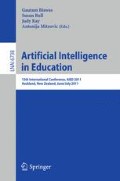Abstract
Open Learner Models (OLM) are believed to facilitate students’ metacognitive activities in learning. Inspectable student models are a simple but very common form of OLM that grant students opportunities to get feedback on their knowledge and reflect on it. This paper uses individualized surveys and interviews with high school students who have at least three years experience learning with the Cognitive Tutor regarding the inspectable student model in the Tutor. We also interviewed a teacher. We found that: i) students pay close attention to the OLM and report that seeing it change encourages them to learn; ii) there is a significant discrepancy between the students’ self-assessment and the system’s assessment; iii) students generally rely on the OLM to make judgments of their learning progress without much active reflection. We discuss potential revisions to the student model based on the findings, which aim to enhance students’ reflection on and self-assessment of their own learning.
Access this chapter
Tax calculation will be finalised at checkout
Purchases are for personal use only
Preview
Unable to display preview. Download preview PDF.
References
Anderson, J.R.: Rules of the Mind. Erlbaum, Hillsdale (1993)
Arroyo, I., Ferguson, K., Johns, J., Dragon, T., Mehranian, H., Fisher, D., Barto, A., Mahadevan, S., Woolf, B.: Repairing Disengagement with Non Invasive Interventions. In: International Conference on Artificial Intelligence in Education, Marina del Rey, CA, pp. 195–202 (2007)
Bull, S.: Supporting Learning with Open Learner Models. In: 4th Hellenic Conference: Information and Communication Technologies in Education, Athens (2004)
Bull, S., Kay, J.: Student Models that Invite the Learner In: The SMILI Open Learner Modeling Framework. International Journal of Artificial Intelligence in Education 17(2), 89–120 (2007)
Bull, S., Kay, J.: Metacognition and Open Learner Models. In: Proceedings of Third Workshop Meta-Cognition and Self-Regulated Learning in Educational Technologies, ITS 2008 (2008)
Corbett, A., McLaughlin, M., Scarpinatto, K.: Modeling Student Knowledge: Cognitive Tutor in High School & College. User Modeling and User-Adapted Interaction 10, 81–108 (2000)
Mitrović, A.: Investigating students’ self-assessment skills. In: Bauer, M., Gmytrasiewicz, P.J., Vassileva, J. (eds.) UM 2001. LNCS (LNAI), vol. 2109, pp. 247–250. Springer, Heidelberg (2001)
Mitrovic, A., Martin, B.: Evaluating the Effects of Open Student Models on Learning. In: de Bra, P., Brusilovsky, P., Conejo, R. (eds.) Proceedings of 2nd International Conference on Adaptive Hypermedia and Adaptive Web-based Systems, pp. 296–305. Springer, Heidelberg (2002)
Ritter, S., Harris, T., Nixon, T., Dickison, D., Murray, C., Towle, B.: Reducing the Knowledge Tracing Space. In: Barnes, Desmarais, Romero, Ventura (eds.) Proceedings of the 2nd International Conference on Educational Data Mining, Cordoba, Spain, pp. 151–160 (2009)
Walonoski, J.A., Heffernan, N.T.: Prevention of off-task gaming behavior in intelligent tutoring systems. In: Ikeda, M., Ashley, K.D., Chan, T.-W. (eds.) ITS 2006. LNCS, vol. 4053, pp. 722–724. Springer, Heidelberg (2006)
Winne, P.H., Hadwin, A.F.: Studying as Self-Regulated Learning. In: Hacker, D.J., Dunlosky, J., Graesser, A.C. (eds.) Metacognition in Educational Theory and Practice, pp. 279–306. Erlbaum, Hillsdale (1998)
Author information
Authors and Affiliations
Editor information
Editors and Affiliations
Rights and permissions
Copyright information
© 2011 Springer-Verlag Berlin Heidelberg
About this paper
Cite this paper
Long, Y., Aleven, V. (2011). Students’ Understanding of Their Student Model. In: Biswas, G., Bull, S., Kay, J., Mitrovic, A. (eds) Artificial Intelligence in Education. AIED 2011. Lecture Notes in Computer Science(), vol 6738. Springer, Berlin, Heidelberg. https://doi.org/10.1007/978-3-642-21869-9_25
Download citation
DOI: https://doi.org/10.1007/978-3-642-21869-9_25
Publisher Name: Springer, Berlin, Heidelberg
Print ISBN: 978-3-642-21868-2
Online ISBN: 978-3-642-21869-9
eBook Packages: Computer ScienceComputer Science (R0)

